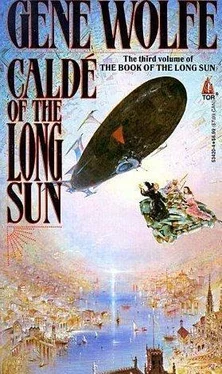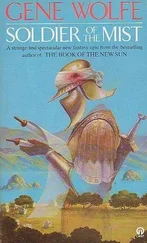help imagining smelled of the tunnels, soap and rinse them, and rub
them dry with a dish towel.
"You'll want to wash up a bit, too, Captain. Please do so while I
change upstairs."
The stair was steeper than he remembered; the manse, which he
had always thought small, smaller than ever. Seated on the bed that
he had left unmade on Molpseday morning, he lashed its wrinkled
sheets with Doctor Crane's wrapping.
He had told the crowd he would burn his tunic and loose brown
trousers, but although soaked and muddy they were still practically
new, and of excellent quality; washed, they might clothe some poor
man for a year or more. He pulled the tunic off and tossed it into the
hamper.
The azoth he had filched from Hyacinth's boudoir was in the
waistband of the trousers. He pressed it to his lips and carried it to
the window to examine it again. It had never been Hyacinth's, from
what Crane had told him; Crane had merely had her keep it, feeling
that her rooms were less likely to be searched than his own. Crane
himself had received it from an unnamed Idlanum in Trivigaunte
who had intended it as a gift for Blood. Was it Blood's, then? If so,
it must be turned over to Blood without fail. There must be no more
theft from Blood; he had gone too far in that direction on Phaesday.
On the other hand, if Crane had been authorized to dispose of it
(as it seemed he had), it was his, since Crane had given it to him as
Crane lay dying. It might be sold for thousands of cards and the
money put to good use--but a moment's self-examination convinced
him that he could never exchange it for money if he had any right to
it.
Someone in the crowd beyond the garden wall had seen him
standing at the window. People were cheering, nudging each other,
and pointing. He stepped back, closed the curtains, and examined
Hyacinth's azoth again, an object of severe beauty and a weapon
worth a company of the Civil Guard--the weapon with which he had
slain the talus in the tunnels, and the one she had threatened him
with when he would not lie with her.
Had her need really been so great? Or had she hoped to make
him love her by giving herself to him, as he had hoped (he
recognized the kernel of truth in the thought) to make her love him
by refusing? Hyacinth was a prostitute, a woman rented for a night
for a few cards--that was to say, for the destruction of the mind of
some forsaken, howling monitor like the one in the buried tower.
He was an augur, a member of the highest and holiest of professions.
So he had been taught.
An augur ready to steal to get just such cards as her body sold for.
An augur ready to steal by night from the man from whom he had
already bullied three cards at noon. One of those cards had bought
Oreb and a cage to keep him in. Would three have bought
Hyacinth? Brought her to this old three-sided cage of a manse, with
its bolted doors and barred windows?
He placed the azoth on his bureau, put Hyacinth's needler and his
beads beside it, and removed his trousers. They were muddier even
than the tunic, the knees actually plastered with mud, though their
color made their state less obvious. Seeing them, it struck him that
augurs might wear black not in order that they might eavesdrop on
the gods while concealed by the color of Tartaros, but because it
made a dramatic background for fresh blood, and masked stains
that could not be washed out.
His shorts, cleaner than the trousers but equally rain-soaked,
followed them into the hamper.
Rude people called augurs butchers for good reason, and there
was butchery enough waiting for him. Leaving aside his proclivity
toward theft, were augurs really any better in the eyes of a god such
as the Outsider than a woman like Hyacinth? Could they be better
than the people they represented before the gods and still represent
them? Bios and chems alike were contemptible creatures in the eyes
of the gods, and ultimately those were the only eyes that mattered.
Eyes in the foggy little mirror in which he shaved caught his. As
be stared, Mucor's deathly grin coalesced below them; in a travesty
of coquetry, she simpered, "This isn't the first time I've seen you
with no clothes on."
He spun around, expecting to see her seated on his bed; she was
not there.
"I wanted to tell you about my window and my father. You were
going to tell him to lock my window so I couldn't get out and bother
you any more."
By that time he had recovered his poise. He got clean undershorts
from the bureau and pulled them on, then shook his head. "I wasn't.
I hoped that I wouldn't have to."
From beyond the bedroom door: '_My Calde?_"
"I'll be down in a moment, Captain."
"_I heard voices, My Calde. You are in no danger?_"
"This manse is haunted, Captain. You may come up and see for
yourself if you like."
Mucor tittered. "Isn't this how you talk to them? In the glasses?"
"To a monitor, you mean?" He had been thinking of one; could
she read his thoughts? "Yes, it's very much like this. You must have
seen them."
"They don't look the same to me."
"I suppose not." With a considerable feeling of relief, Silk pulled
on clean black trousers.
"I thought I'd be one for you."
He nodded in recognition of her consideration. "Just as you use
your window and the gods their Sacred Windows. I had not thought
of the parallel, but I should have."
Unreflected, her face in his mirror bobbed up and down. "I
wanted to tell you it's no good any more, telling my father to lock
my window. He'll kill you if he sees you, now. Potto said he had to,
and he said he would."
The Ayuntamiento had learned that he was alive and in the city,
clearly; it would learn that he was here soon, if it had not already. It
would send loyal members of the Guard, might even send soldiers.
"So it doesn't matter. My body will die soon anyway, and I'll be
free like the others. Do you care?"
"Yes. Yes, I do. Very much. Why will your body die?"
"Because I don't cat. I used to like it, but I don't any more. I'd
rather be free."
Her face had begun to fade. He blinked, and nothing but the
hollows that had been her eyes remained. A breath of wind stirred
the curtains, and those hollows, too, were gone.
He said, "You must eat, Mucor. I don't want you to die." Hoping
for a reply, he waited. "I know you can hear me. You have to eat."
He had intended to tell her that he had wronged her and her father.
That he would make amends, although Blood might kill him
afterward. But it was too late.
Wiping his eyes, he got out his last clean tunic. His prayer beads
and a handkerchief went into one trouser pocket, Hyacinth's
needler into the other (He would return it when he could, but that
problematic moment at which they might meet again seemed
agonizingly remote.) His waistband claimed the azoth; it was
possible that augury would provide some hint of what he ought to do
with it. He considered selling it again, and thought again of the
howling face that had been so like Mucor's in his minor, and
shuddered.
Clean collar and cuffs on his second-best robe would have to do.
And here was the captain, waiting at the foot of the stair and
looking nearly as spruce as he had in that place--what had it been
called? In the Rusty Lantern in Limna.
"I was concerned for your safety, My Calde."
"For my reputation, you mean. You heard a woman's voice."
Читать дальше









